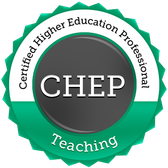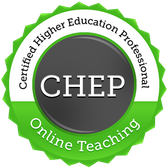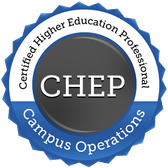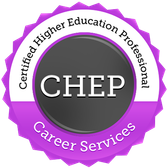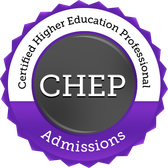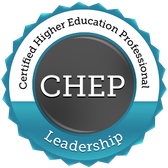Badge Evidence | Completed Courses (4 Hours Each)
AD106RPowerful Telephone Techniques
Whether your admissions personnel work exclusively by telephone or use the phone for setting a face-to-face appointment, they need a tool kit of powerful telephone techniques to be successful in working with students. This course provides best practices for both inbound and outbound calls. Admissions professionals learn how to project professionalism and a positive attitude in their telephone personality and identify methods for conducting effective and appropriate calls.
AD108RBest Practices in an Ethical Enrollment Process
Ethical behavior in recruitment is essential to student and institutional success and is a crucial component of a compliant institution. This course provides a framework to evaluate your current admissions interview process and offers new tools that allow for meaningful connections with today's students. An ethical enrollment process will help your students make their own best decisions and will increase the effectiveness of your admissions personnel.
AD112Best Practices in Presenting the Value of Your Institution
Let's face it, today's students have a plethora of information at their fingertips; but can they truly understand in a meaningful way all that your school has to offer? This course takes product knowledge and presentation skills to a higher level with enhanced tools and techniques to improve your "sales" skills. Additionally, advanced methods for presenting the attributes and benefits of your institution will be explored, along with successfully addressing challenges and resources.
In this course, we will examine the fundamentals of value, benefits, and worth. In addition, we will utilize techniques and tools to prepare and present the value of your institution. Finally, we will review tips and best practices to maximize your value presentation. Once you have completed the course and activities, you will be prepared and ready to best serve your students and school with your value presentations.
In this course, we will examine the fundamentals of value, benefits, and worth. In addition, we will utilize techniques and tools to prepare and present the value of your institution. Finally, we will review tips and best practices to maximize your value presentation. Once you have completed the course and activities, you will be prepared and ready to best serve your students and school with your value presentations.
AD113Managing Your Attitude and Energy to Maximize Your Effectiveness
The most successful admissions professionals are those who maintain a positive attitude and energy, but maintaining that positivity each and every day can be tough. This course focuses on the importance of understanding and building your personal attitude and energy to maximize your effectiveness. You will have the opportunity to assess your attitude and energy and manage these elements to maximize your performance. In this course, we will examine the fundamentals of attitude and energy and understand why they are so important to your success. In addition, we will utilize assessments to look at your current attitude and energy levels. Finally, we will review tips and best practices to enhance your energy and attitude output. Once you have completed the course and activities, you will be prepared and ready to best serve your students and school by maximizing your personal attitude and energy.
AD115Effective Questioning and Listening
Questioning and listening are essential elements of communication - especially when working with students. This course provides an in-depth understanding of the purpose of skillful listening, and how this is necessary to be the most effective in your position. In addition, this course provides an in-depth understanding of the purpose and types of meaningful questions. You'll be introduced to the fundamentals of both questioning and listening, as well as new tools and techniques to help you refine your questioning and listening skills.
AD200Relationship Building in the Admissions Process
The purpose of this course is to improve the relationship and dynamics between the admissions representative and prospective students to ensure an educational goal is soundly met. The relationship cycle, the importance of relationships, and the process of finalizing the enrollment are discussed.
The goal of this course is to help develop a better understanding of the topic and produce tangible resources to help implement plans, strategies, and ideas at your school. In addition to lecture videos, links to possible resources, and assessments, you will be able to utilize the Journal and Learning Activities.
CM140Title IX and VAWA Training: Building Safer Campuses
This course is designed to assist personnel at all levels of an educational institution in the understanding of the provisions of Title IX of the Education Amendments of 1972 ("Title IX") as amended on August 1, 2024, and the Clery Act as amended in the Violence Against Women Reauthorization Act of 2013 ("VAWA"). These laws require that all individuals in an educational institution understand and comply with the laws in terms of what is prohibited behavior in relation to sex-based harassment and/or sexual violence, and what steps are to be followed when such prohibited conduct occurs. This course gives the participants information about the laws, as well as procedures to follow, to provide for the rights of all individuals under the laws. It also provides additional resources to assist educational institutions in continuing to build and strengthen their Title IX and VAWA policies, procedures and training throughout the year.
CM142Understanding Title IX, VAWA, and the Clery Act
This course will review Title IX, the Jeanne Clery Disclosure of Campus Security Policy and Campus Crime Statistics Act, and the Violence Against Women Act. In addition to the background of each topic, victim rights, support system implementation, and grievance policies will also be explored.
The goal of this course is to help develop a better understanding of the topic and produce tangible resources to help implement plans, strategies, and ideas at your school.
In addition to lecture videos, links to resources, and assessments, you will be able to utilize the Journal and Learning Activities. Take advantage of a method that works best for you.
CM151Onsite Visits - Be Ready Anytime
Is your campus ready for a full unannounced visit at any time? Onsite visits are becoming more frequent in recent years and unannounced visits even more so. This training is designed to aid campus leaders to be prepared, using best practices and practical tools, to host an onsite visitor at any time, including visits that are unannounced, by any organization such as state agencies, veterans' organizations, regional, national and programmatic accrediting agencies and the Department of Education.
CS106Becoming an Effective Job Developer
Although job developing requires a mix of critical skills, many career advisors are forced to learn them through the "sink or swim" method. They're often asked to immediately make a specific number of cold-calls daily. They learn that "job developing" is synonymous with cold-calling. It isn't. This course covers how to properly prepare for job developing, how to prospect, prioritize employer contact, and communicate with employers to address objections, get job orders, manage them to completion, and continuously engage employers and candidates to develop long-term partnerships. Job developing should be more comprehensive than a simple list of employers to cold-call.
CS107Advising Students on Using Digital Career-Marketing Strategies
In today's world where jobs are posted online, matching algorithms screen digital résumés, and recruiters source candidates online, students must market themselves online. Writing a résumé and cover letter alone is no longer an adequate skill set for career seekers to successfully find and secure employment as well as manage, advance, and transition their career throughout life. Students must know how to digitally market themselves, and 21st century career advisors must know how to advise them. This course will help you advise students on developing digital career-marketing strategies for career success.
CS111Providing Career Services for LGBTQ Students
There are millions of lesbian, gay, bisexual, transgender, and queer (LGBTQ) job seekers struggling to find careers and even hold down a job, due in part to their sexual orientation and gender identity. What amplifies this issue is the fact that many college career advisors who are supposed to help struggling jobseekers are not trained to address the unique struggles their LGBTQ students face in their career development. This course equips career advisors with the perspective, knowledge, and practical skills necessary to provide quality career services for their LGBTQ students, who greatly need their assistance.
CS113Becoming an Effective Career Coach
Effectively coaching students to achieve their goals in a way that builds autonomy, confidence, and accountability is fundamental to the role of a career services professional. Despite this fact, many career professionals have never engaged in professional development to build their coaching skills. This course helps career services professionals develop fundamental coaching skills so they can act as a catalyst and facilitator in assisting students to work towards their self-identified goals, with the belief that self-identified goals lead to increased student buy-in and motivation for attainment. Learn to put practical coaching techniques into action to maximize your results with students.
*This course is relevant to a variety of career support professionals regardless of titles such as career counselors, advisors, coordinators, or "case managers" serving a variety of populations which may include students, out-of-school youth, or dislocated workers (youth or adults).
CS120Interviewing 101
Help students ace the interview with successful tactics to showcase their qualities and make them the best fit for the job. A career management specialist will be able to master the appropriate actions for students to take before, during, and after the interview. These tactics can then be implemented in a career management class or during the preparations for prospective job interviews. The goal of this course is to help develop a better understanding of the topic and produce tangible resources to help implement plans, strategies, and ideas at your school. In addition to lecture videos, resource links, and assessments, you will be able to utilize Journal and Learning Activities, which will continue to be useful after successful completion of the course.
CS125Working Effectively in Remote Environments
Remote work has been on the rise for decades and is now shaping the way companies everywhere do business. To work effectively in remote environments, you must learn new skills, tools, and mindsets that enable you to communicate, collaborate, and connect with colleagues you may never physically meet.
This course will teach anyone considering or currently working in a remote position how to boost their productivity, balance work-life demands, and build meaningful professional relationships regardless of place, proximity, or time zone. With the knowledge and skills developed in this course, you'll be better equipped to thrive, or help others to thrive, in remote work settings.
CS126Goal Setting and Motivation Strategies for Career Professionals
Although empowering learners to set and achieve career goals is the essence of career guidance and education, many professionals have little training on the science of motivation and goal setting. As career professionals, it is crucial that you understand these principles in order to effectively support learners who are navigating the complexities of career planning, including setting and achieving goals, maintaining motivation, and adapting to changing circumstances.
Decades of research show that when goals are matched to your learners' interests, values and abilities, their motivation and achievement are more likely to increase. This course provides essential knowledge of motivation and goal setting that equips professionals to help learners strive for career success.
*The course contains multiple done-for-you tools and resources for download and use with learners.
ED101Effective Teaching Strategies
This introductory course covers the essential roles of a teacher and the competencies required to be a successful instructor in an educational institution. Proven techniques and strategies for planning and preparation are presented and discussed. In addition, the course offers effective methods for conducting the first class meeting and delivering course content. This course provides a solid foundation for new instructors and serves as an excellent refresher for more experienced instructors.
ED102Student Retention Methods
The instructor is the real key to student retention at any educational institution. Instructors must keep focused on student motivation and retention each and every day of class. Developing strategies for retaining students throughout the entire training sequence is both complex and rewarding. All instructors should have the goal of seeing all of their students successfully complete their class. This course helps you reach that goal by helping you to understand your students and use proven motivation and retention techniques to keep them enrolled and engaged in the learning process.
ED105Instructional Planning for Student Success
This course shows instructors how to develop a comprehensive approach to effective and efficient instruction. From preparation for the classroom to selection of instructional delivery methods, the course provides effective ways of planning instruction to help instructors keep the content focused and the students engaged. We also cover the steps to set up a complete evaluation system that will work in all settings.
ED106Enhancing Student Learning
This course provides methodologies and examples to help instructors increase content retention and application by students in need of support. The course starts by covering the skills needed by instructors to be clear communicators. We then discuss ways instructors can become effective in monitoring students and using student groups as learning tools. The course concludes by covering techniques and strategies to instruct diverse learners, including learners with disabilities.
ED110Time and Stress Management for Instructors
Outstanding teachers serve their students by guiding them through their coursework and motivating them to complete program requirements. Instructors at educational institutions are often faced with high stress resulting from heavy teaching loads and limited time. When teachers cannot manage their own time and stress, they cannot fully serve the needs of their students. This course will show instructors how to manage time and stress in their lives and teach some of these skills to their students.
ED114RQuestioning in the Classroom
In this course we describe the types and characteristics of questions instructors ask when teaching. We define two methods of classifying questions: the first according to the particular skill required to answer them, and the second according to their complexity and the cognitive level used when responding. We discuss appropriate circumstances when various types of questions should be asked, and we refer to studies that support our recommendations. Three instructional strategies are explained that can result in more effective questioning. Four practices are described that instructors use—or should use—during their lessons. Finally, thirteen tips are offered for review and for enhancing and improving an instructor’s questioning strategy and technique.
ED115RSoft Skills for Instructors
This survey course provides an introductory discussion about how good soft skills help instructors to be successful. A distinction is made between hard skills, soft skills, people skills, and workplace behaviors. Selected soft skills are listed for various categories of businesses and industries, including the teaching profession. Two studies are referenced that highlight skills that are frequently cited in the literature. One study was published in 1997, while the other was conducted specifically for this course in 2024. Selected tips are offered for improving one's soft skills. Numerous hyperlinks are included that direct the reader to a variety of online enrichment materials, including a few online instruments that help individuals learn more about their own soft skills.
ED116Critical Thinking Processes and Applications
The majority of careers require the ability to think critically and problem solve at one level or another. Employers seek individuals who can think independently, propose solutions, and solve problems. The content in this course provides the foundation for critical thinking and demonstrates how people with different interests, abilities, and aptitudes approach problem solving. The course covers the different kinds of intelligence and how they impact critical thinking, for a broader understanding of how people process solutions to problems. It concludes with step-by-step instructions for helping students develop and refine their own critical thinking skills.
ED135Teaching Multigenerational Learners
As students from different generations are enrolling in post-secondary settings today, instructors are presented with the challenge of how to engage, instruct and relate to these multigenerational learners. This course gives profiles of different generational learners and how they engage in the learning process. Content is shared on how to relate to learners of the different generations and how to use students' life experiences as learning opportunities. As technology is an essential part of instructional delivery, strategies are given for building on the abilities of multigenerational students to use social networks, portable media (given the parameters of school policy), and personal interaction. In addition, instructors are given methods that can be used to help students develop the critical thinking and interpersonal skills needed for career success.
ED137Cultural Diversity: Including Every Student
Cultural diversity includes a wide scope of differences. While we plan instruction to meet outcomes that are usually supporting a set of pre-determined standards, instructors are faced with a high level of diversity in every class group. It is important for instructors to be aware of diversity and strive to include every student, regardless of difference, in their learning community. This requires intentional planning and accessible instructional design that includes all students and empowers every student to succeed.
ED140Five Myth-Understandings about Learning and the Brain
Did you ever hear that we only use about 10% of our brains? Were you ever told that you are more right-brained or left-brained? Did you know that males and females learn differently as a result of differences in their brains? Did you know that people have different learning styles? Did you ever hear that you retain more of what you do or see than of what you read or hear? If you answered "yes" to any of these questions, you have experienced a "myth-understanding." The purpose of this course is to explain the background and truth about these myth-understandings that pervade much of the popular literature to this day. All persons who are involved in the education of others must guard against these myths and ensure that they do not influence their professional practices.
Note: Many learning theories have been developed that represent the efforts of researchers with different perspectives on how individuals develop and learn. As within any field, facts and myths may be driven by controversial opinions and philosophies that need to be considered by individuals engaged in professional development.
ED145Stress Reduction and Management for Educators
This course will provide an overview of a few stress reduction/management techniques for educators. Stress plays a significant role in educators' lives and careers; therefore, ideas for self-help are essential. Details will be provided about ways to reduce stress-related physical/mental issues, build emotional resilience, and practice mindfulness, along with other methods for stress reduction/management. The course provides not only information for educators, but activities for students that can be incorporated to help them reduce/manage their stress as well. With this information, educators may find more work-life balance, health benefits, and other opportunities for stress reduction and management. Application of these techniques can be helpful in enabling educators to better cope with the stress in their lives and careers.
ED406Motivating Others
Motivation can be the difference between success and failure. In this course, the idea of how motivation impacts people will be discussed. Activities will focus on improving motivation in students, and other people you interact with, as well as yourself. The goal of this course is to help develop a better understanding of the topic, and produce tangible resources to help implement plans, strategies, and ideas at your institution. In addition to lecture videos, resource links, and assessments, you will be able to utilize Learning Activities, which will continue to be useful after successful completion of the course.
ED410Increasing Student Retention by Flipping the Classroom
The Flipped Classroom model has become one of the most commonly implemented educational models seen in classrooms today. Through this course, we will explore the basics of the flipped classroom, how and why it works to increase student retention, and go over steps to start incorporating flipped classroom elements in your courses.
The goal of this course is to help develop a better understanding of the topic and produce tangible resources to help implement plans, strategies, and ideas at your school. In addition to lecture videos, possible resource links, and assessments, you will be able to utilize the Journal and Learning Activities.
EL102Online Teaching Techniques
Your degree of success as an online instructor relies heavily on several factors, among which are your level of preparedness before the date on which the course is launched; your ability to make a smooth transition into the roles and responsibilities associated with teaching in an online environment; and the effectiveness and efficiency with which you manage learners, instructional transactions embedded in the course as well as the learning environment. In this course, you will learn how to project your authority and presence into the e-learning environment, build a relationship with each learner, promote and nurture learner participation, provide informative and constructive feedback in a timely manner, minimize attrition, manage communications, manage unacceptable behavior and resolve disagreements.
EL103RTeaching Online: A Student-Centered Approach
This course will provide you with the knowledge and skills to successfully author, teach, assess, and revise online courses. You will learn to develop a course framework with consistent modules. Building an online community and constructing a dynamic syllabus are important in helping you communicate with students. You will also learn how to develop an assessment plan that includes peer and self-assessment. No online course is complete without a comprehensive revision cycle. This course will walk you through the process of "closing the loop" to create a complete revision and improvement plan for your online course. We will provide you with ideas for student-centered learning that includes activities and intellectual interactions using a variety of technological tools.
EL105ROnline Language: Communicating with Students
This course provides information to help you effectively communicate with students and encourage communication among students in an online environment. You will learn the importance of facilitating instructor-to-student (I2S), student-to-instructor (S2I), and student-to-student (S2S) communication. Digital technology tools play a vital role in the modern communication process, and several are discussed in this course. In addition, discussion is provided to help you further understand how to manage and measure communication in an online course and help students communicate effectively.
EL106Evaluating Student Learning in Online Courses
This course will provide you with the knowledge to effectively evaluate student learning in an online environment. Technology tools play a vital role in the evaluation process and several are discussed in this module. Discussion will also be provided to help you further understand how to complete formative and summative assessments, as well as the advantages and disadvantages of objective and subjective assessments. Value-added assessments are also discussed in light of how they can be completed and provide feedback for course revision.
EL108Preparing Students to Become Good Online Learners
This course will provide you with strategies and techniques to help prepare students for the online environment. To do so, you must also assess your strengths and weaknesses as an online instructor. As you help students assess their readiness for online learning, you are also preparing them for the expectations and realities of the online environment. By identifying students' strengths and weaknesses, you can provide guidance to help them achieve the learning outcomes. This course not only notes the necessary technical skills, it also discusses non-technical skills as well as techniques for successful learning and helping students develop their online persona.
EL110Effective Use of Social Media in Online Courses
This course will provide you with strategies and techniques to help use social networking in the online environment. It provides an overview of social networking, media hosting and sharing, microblogging and blogging. An introduction to each will be provided, and content development, policy, facilitation and assessment will all be discussed. Suggested activities will also be provided.
EL112Workload Management Strategies for Teaching Online
This course will provide you with strategies and techniques to help you reduce your workload in the online environment. The course begins with an overview of good principles for education and questions to consider prior to developing Workload Management Strategies (WLMS). This course also provides WLMS for teaching online, communicating and collaborating, and revising your online course.
EL115RGaming and Simulation in Online Learning
This course will provide you with strategies and techniques to immerse students in an interactive environment that will incorporate gaming and simulations to introduce, engage, and reinforce online learning. This course will begin with definitions of gaming and simulations as a tool for online learning and will provide guidance to evaluate, implement, and assess the effectiveness of games.
EL117Understanding Personality Traits of Online Instructors and Learners
This course will provide you with an overview of online instructors' and learners' personality traits. Participants will be provided with information about the traits themselves, as well as how to identify such traits, utilize them, and develop lessons to reach all students.
EL119Virtual Internships
This course will provide you with an overview of virtual internships. Virtual internships are also referred to as remote internships, virtual placement programs, and virtual co-ops. Virtual internships have been implemented in many online programs in various settings. This course will provide a working definition and information pertaining to various components of virtual internships. It is essential for instructors working with virtual interns to share this information with employers and students to help prepare them for virtual internships.
EL121Teaching Skills and Trades Online
Although online learning is becoming more normalized in our educational institutions, there are still many questions about its effectiveness for certain areas of study and training. There remains an idea that online learning is mostly passive and therefore unsuitable for anything active and specifically the development of skills and trades. This course will explore the changing realities of online learning and how effective it can be in the training of skills and trades. Strategies will be shared to facilitate the online teaching of applied skills in simulated and real-world settings.
EL142Effective Online Assessments
Assessments are a vital part of the learning process. They allow students and teachers to see how well they are doing and what needs to be improved upon. When offering online assessments, it is sometimes difficult to develop effective methods due to the new digital learning landscape, experience level with online teaching, or with tweaking on-ground assessments to create an effective online form.
In this course, students will identify the impacts and opportunities that online assessments have in the digital learning process, discover the challenges that can present themselves and the strategies to overcome them, and evaluate guidelines for crafting effective assessment opportunities in an online course.
FA120Default Prevention: A State of Mind
This course offers proven-successful techniques that ultimately prevent student loan delinquencies and defaults. Because there is not one miracle that reduces the chance of student loan defaults, this compilation of ideas and practices collectively greatly reduces those risks by giving ownership of the loan responsibilities to the students who benefit from them. By integrating effective borrower education and interaction from the day your students walk through your front door, your students will embrace the state of mind needed to give them lifetime accountability for their Federal Student Loans obligations.
FA230Financial Aid Management - Compliance without Compromise
With a seemingly endless stream of new laws and regulations, institutions have become burdened with ensuring they are compliant, while continuing to give great customer service to their students and families and all while achieving larger institutional goals. The role of the Financial Aid Office in compliance cannot be underestimated, but the Director of Financial Aid cannot ensure compliance in a vacuum.
This course is designed to examine the fundamentals of law and regulation, and of the enforcement process. More importantly, this course provides tools for School Directors, Chief Financial Officers, Enrollment Managers, and Financial Aid staff to develop and build compliant practices that don't interfere with effective operations, customer service or institutional goals.
FA231Regulatory Compliance - Outside the Financial Aid Office
This course will help participants to interpret the many rules and regulations that are required by educational institutions offering Title IV funding. It will aid in preparing management and faculty in recognizing that compliance is the responsibility of the entire institution and is not just the job of the Financial Aid Office. Course content will also aid the individual in building a "culture of compliance" which will encourage teamwork and secure the cooperation of others on campus.
LS101RDo You Manage Or Lead?
This course explores the critical differences between management and leadership. Participants will be introduced to definitions and myths about each area as well as how management and leadership must coexist for an organization to operate effectively. Participants will explore their own management/leadership tendencies through exercises to see leadership and management in action.
LS102How Do You Lead?
Not everyone is suited for, or desires, a leadership position. One of the first steps to being an effective leader is to understand the desire to lead in the first place. Participants will explore their motivation to lead and develop a deeper understanding of their leader style(s).
LS103RYour Leadership Impact
To improve your impact and effectiveness as a leader, you must not only understand the role of a leader, but you must also take into consideration the followers and the situation. This course defines leadership impact and explores the interactional framework for leadership.
LS104RYour Leadership Legacy
The higher education industry provides a wealth of opportunities and challenges for those seeking leadership positions. In this course, participants will gain a deeper understanding of the higher education sector and themselves. The importance of higher education institutions will be explored along with developing a personal leadership legacy.
LS105RYour Leadership Toolkit
Get ready to add a number of skills to your toolkit as you develop as a leader! This course focuses on increased self-awareness in communication styles and learning; developing deeper understanding through empathic listening; and motivating through innovation.
LS106This Way to Leadership
This course provides you with a framework to put your self-discovery and learning into a workable plan to further develop your leadership skills. A step-by-step process is offered to help you create a meaningful Personal Leadership Development Plan (PLDP) complete with the development of SMART Goals and advice from some of today's leaders in the higher education sector.
ML116Writing Skills
Skillful writing helps you accomplish your business objectives and extends your influence as a manager. In this course, you will learn to create clearer, more effective written communications. The course includes specific guidelines for preparing memos, letters, emails, and other common business documents.
ML133Goal Setting
This course will show you how to set realistic goals, prioritize tasks, and track milestones to improve performance and morale.
ML135Time Management
This course will help you master effective time management techniques. You will learn to analyze how you currently spend your time and pinpoint opportunities for improvement. The course will show you how to plan your time efficiently using scheduling tools, control time-wasters, and evaluate your schedule once it is underway.
ML136Stress Management
In this course, you will learn the difference between positive stress that enhances productivity and negative stress that breeds tension, lowers productivity, and undercuts job satisfaction. The course includes strategies for dealing with underlying causes of worry and stress, with tactical advice and coping mechanisms for immediate problem management.
OH110Ohio Faculty and Staff Compliance Course
This compliance course reflects the compliance standards that Ohio educators need to know and understand. The goal of this course is to help develop a better understanding of the topic, and produce tangible resources to help implement plans, strategies, and ideas at your school. This course will cover governing bodies, the enrollment process, standards, compliance concepts and more. Through video lectures, resource links, and assessments, learners will gain knowledge about and understand compliance standards.
This course is approved by the Ohio State Board of Career Colleges and Schools to satisfy compliance and ethics continuing education requirements. Participants who successfully complete the course will receive a certificate of completion with 4 hours of continuing education credits.
OH115Ohio Admissions Agent - New Permit Course
This course will satisfy the Agent Training Requirements for new Agents in Ohio. It is required by the Ohio State Board of Career Colleges and Schools for all Admissions Agents applying for a new permit.
This course will review the provisions of Ohio’s laws (Ohio Revised Code Chapter 3332) and administrative regulations (Ohio Administrative Code Chapter 3332) that govern student solicitation, recruiting, and the oversight of agents (admissions representatives).
OH120Ohio Admissions Agent - Renewal Course
This course is part of the Agent Training Requirements for Agents applying for a renewal license in Ohio. It is required by the Ohio State Board of Career Colleges and Schools for all Admissions Agents applying for a renewal license. This course is designed to cover the regulations in Ohio Administrative Code 3332.1.17.2, focusing on ethics and professionalism in the admissions process.
OP106Developing New Programs: Research and Selection
Educational institutions need to be aware of emerging employment opportunities in new and expanding fields if they are going to continue to attract students. Most licensing and accrediting agencies ask an institution for some form of feasibility study when submitting new program-add applications. The research involved in this step often requires proof of need for the program, number of anticipated job openings, and input from employers. This course outlines ways to collect data to make an effective decision and show regulatory agencies proof of employment opportunities. Step-by-step directions are included to assist institution staff in conducting effective research and preparation of curriculum to meet employer specifications.
OP115RHiring the Right Faculty for Your Institution
This course shows you how to hire high-quality instructors and orient them to your institution. The skills also apply to hiring staff. It's easy to hire someone to do a job. But it can be difficult to hire the right person. You want instructors who are top notch. They represent your institution and interact with the most people at your campus and particularly your students. This course starts with how to determine exactly what type of people you need as your instructors. Then it shows you how to recruit and hire them. Once hired, you'll learn how to introduce them to the working environment at your institution. By the time you finish this course, you'll be recruiting, hiring, and orienting quality instructors. You'll see results in improved enrollments, student achievement, retention, and completion.
OP121Managing Online Faculty at a Distance
It is no longer news that predictive learning analytics are changing online classroom instruction. This course teaches current trends in locating, hiring, monitoring and retaining the best professionals that specialize in online instruction. More importantly, this course provides insights for using the new predictive analytic approaches to optimize management of online faculty. Generalized "best practices" are waning in favor of real-time monitoring for individualized qualitative and quantitative analyses. This real-time approach provides significantly increased student success and retention. Also addressed in the course is how to build a strong faculty management team, continuing faculty development recommendations and various business considerations.
